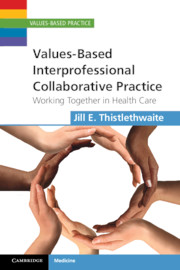Book contents
- Frontmatter
- Contents
- Preface
- Forewords
- Part 1 Introduction and theory
- Part 2 Primary care and the primary health care team
- 4 A patient complaint: team meetings, policy and practice values – raising awareness in the team
- 5 A well person health check, health promotion and disease prevention: different lifestyles, different values
- 6 A patient with medically unexplained symptoms: applying evidence and values for shared decision-making, self-care and co-production of health
- 7 A request for strong analgesia: honesty and trust
- 8 Asylum seekers and refugees: working across cultures
- 9 A request for a home birth and other pregnancy-related consultations
- 10 Community-based care and the wider health care team
- 11 Ageing and end of life decisions
- 12 Referrals and the interface between primary and secondary care: looking after ‘our’ patients
- 13 Living with visible difference and valuing appearance
- 14 Collaboration with other professionals: in and outside health care
- 15 Learning in and about teams
- Afterword
- Index
- References
9 - A request for a home birth and other pregnancy-related consultations
Published online by Cambridge University Press: 05 October 2012
- Frontmatter
- Contents
- Preface
- Forewords
- Part 1 Introduction and theory
- Part 2 Primary care and the primary health care team
- 4 A patient complaint: team meetings, policy and practice values – raising awareness in the team
- 5 A well person health check, health promotion and disease prevention: different lifestyles, different values
- 6 A patient with medically unexplained symptoms: applying evidence and values for shared decision-making, self-care and co-production of health
- 7 A request for strong analgesia: honesty and trust
- 8 Asylum seekers and refugees: working across cultures
- 9 A request for a home birth and other pregnancy-related consultations
- 10 Community-based care and the wider health care team
- 11 Ageing and end of life decisions
- 12 Referrals and the interface between primary and secondary care: looking after ‘our’ patients
- 13 Living with visible difference and valuing appearance
- 14 Collaboration with other professionals: in and outside health care
- 15 Learning in and about teams
- Afterword
- Index
- References
Summary
This chapter considers values-based practice in the context of pregnancy and giving birth and in particular the concept of shared decision making as a component of management planning when several options are available. This is another challenging area for the team as there are often conflicts between what is considered best for the mother and what is considered best for the foetus. Moreover, the foetus is obviously not able to express any values of its own and therefore the family and health care team may act as advocates for the baby, with potential values clashes.
(Of interest is the language of obstetrics and midwifery. As a doctor I first used the word delivery as in ‘home delivery’ but my midwife colleague advised that birth is preferred. Deliver focuses on the action of the professional, while birth relates more to the mother. I have therefore mainly used birth in this chapter.)
Home births: a controversial option
The Moorland Surgery is in a semi-rural area of North Yorkshire. The nearest general hospital with a maternity unit is 10 miles away by a road that can be treacherous in winter ice and snow. The general practice has four full-time partners (three male and one female), two parttime (one male and one female) and currently a male GP registrar. he full-time female GP (Sheila) has an interest in GP obstetrics and, at 58 years old, has delivered many babies both at home and in the GP-led unit over 30 years. When community midwives became more autonomous, they began to carry out the majority of deliveries, though until 9 years ago it was practice policy that a GP would always be present if possible and in case of problems. he number of women opting for a home birth has substantially declined and the last one took place over a year ago. Now, none of the other doctors participate in the weekly antenatal clinic, though one is always on site doing other work and can help or give advice if needed. Sheila feels that her partners and especially the younger GPs are missing out on a key area of primary care and, though she doesn’t miss the long nights waiting for babies to be born, she regrets what she thinks of as the de-skilling of doctors in some areas of practice. None of the other GPs are at all interested in intra-partum care, and indeed feel that, as they would not get enough practice, it would be dangerous for them to be involved. Sheila is aghast that delivering a baby is no longer considered a core skill to be learnt at medical school.
- Type
- Chapter
- Information
- Values-Based Interprofessional Collaborative PracticeWorking Together in Health Care, pp. 95 - 106Publisher: Cambridge University PressPrint publication year: 2012

